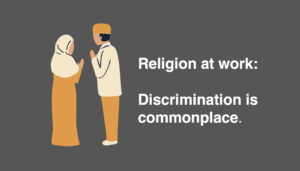Religion at work: discrimination is commonplace.
A recent study conducted by business psychology consultancy Pearn Kandola has shed light on the prevalence of discrimination against religious employees in workplaces. The Religion at Work report surveyed 6,315 workers in the UK and the US, representing various religious backgrounds including Buddhism, Christianity, Hinduism, Judaism, Islam, and Sikhism. The findings reveal concerning trends and experiences faced by religious employees.
According to the report, 47% of respondents expressed discomfort discussing religious festivals they celebrate at work. Furthermore, out of over 3,400 individuals who wore religious dress or symbols, 64% felt uncomfortable wearing them in the workplace, with 38% stating that their organisations could do more to be inclusive of different faiths.
The study also found that one-fifth (19%) of participants had their requests for time off to observe religious holidays or festivals rejected. Disturbingly, nearly a third (32%) of employees who expressed their religious identity at work reported negative experiences, including mockery, exclusion, stereotyping, and discrimination.
The report’s author, Professor Binna Kandola, expressed disappointment regarding these findings, emphasising that organisations often fall short in creating open and inclusive environments for people of faith. The study highlighted stark differences in how different religious groups were treated when requesting annual leave. Christian respondents were more likely to have their holy day leave requests approved (69%), while only 25% of Hindu respondents experienced the same. Additionally, Muslim respondents (31%) were more likely to have their requests rejected without a valid business reason, compared to 2% of Christian respondents.
The study also revealed disparities between the UK and the US, with US employees being more likely to have their line managers approve annual leave for religious festivals (53% in the US compared to 19% in the UK). In the UK, apart from Christianity, employees from all other religious groups were more likely to have their requests for religious festival leave rejected without a valid business reason.
To gain further insights, Pearn Kandola also surveyed a nationally representative sample of 2,000 British individuals. The results indicated that nearly 19% of respondents witnessed someone being judged due to their religious beliefs in the workplace. Common forms of discrimination observed included religious colleagues becoming the subject of jokes, being excluded from activities, being denied annual leave for religious festivals, being instructed not to wear religious attire, facing mockery for their dietary choices, and being asked to remove religious symbols.
The findings of this study serve as a wake-up call, urging organisations to take proactive steps to improve the experiences of people of faith in the workplace. By fostering inclusivity and embracing diversity, businesses can create a more positive and supportive environment for all employees, irrespective of their religious beliefs.


